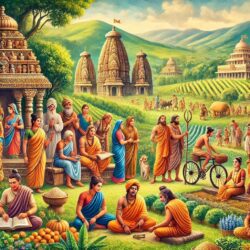This is a conversation between Arjun and Avni.
They are discussing about the importance of Social Order in Sanatana Dharma.
Hello Avni.
The social system is fascinating, isn't it? I mean, take the idea "This is mine, that is another’s"—that's for the narrow-minded. For the magnanimous, the entire world is one family.
Absolutely. A family or society really is like an institution. For it to run smoothly, its members must act like different limbs, each doing their specific functions but working in unison with a single purpose.
Right! In a cohesive family unit, members naturally fit into their roles, but that’s not always the case in society. So, what kind of limbs does a society need? What functions must be performed? What skills are required to fulfil these functions?
According to Sanātana Dharma, there are specific roles and responsibilities for society and family members called varnāśrama dharmās.
Oh, yes! The varṇa system. The sages categorized people into four varṇās: brāhmaṇa, kshatriya, vaiśya, and shūdra. Each had certain duties based on their aptitudes and activities, right?
Exactly. The brāhmaṇas were responsible for performing yajñās, studying and teaching Vēdas and Śāstrās, and giving and receiving donations. Kshatriyas managed administration and public protection, while vaiśyas took care of agriculture, animal husbandry, trade, and giving donations.
And the shūdras were essential too, providing industrial work, farming labor, skilled craftsmanship, and services. But this classification, which was meant to be based on activity and aptitude, got misunderstood and turned into the rigid caste system we know today.
Yeah, that's unfortunate. Just like the "Constitution of India" is a book respected by the people, the varṇa system's duties should have been about respecting each other's roles. Even the abstract Cosmic Person described in Purusha Sūkta needed different limbs to function properly.
True. This balance is not just about social order but maintaining the natural order of the universe. An imbalance can lead to social unrest, ethical degradation, and a decline in spiritual values. These might not be immediately apparent but will have long-term consequences.
That's why it's crucial to adhere to Dharma and ensure each individual and varṇa performs their duties with integrity and dedication. The Purusha Sūkta describes the Cosmic Person's head as brāhmaṇas, arms as kshatriyas, thighs as vaiśyas, and feet as shūdras—each part essential for the whole to function.
And even today, though the traditional varṇa system based on birth is less prevalent, the roles and duties are still relevant. Teachers, soldiers, industrialists, and workers all play their part in society, much like the varṇās.
Indeed, the shift is towards a more meritocratic approach where one’s profession is based on personal capabilities and choices. It aligns with the core principle of Sanātana Dharma—fulfilling one’s Dharma with dedication and integrity, regardless of one’s background.
Sri Krishna's statement in the Gita that guṇas and karmas determine caste, not birth, is truly reflected today. It's about individual aptitude steering them to acquire skills in their field of choice.
And it's the modern educational system's responsibility to preserve traditional skills and fine arts from extinction. The Vishwakarma Yojana launched by the Prime Minister is a step towards that.
Every profession today is associated with some form of service. We often don't recognize it, but everyone, from lawmakers to farmers, contributes to society's welfare.
And as citizens, we have the right and duty to ensure our society's success, starting with exercising our right to vote. Service is integral to all professions today, and dignity of labor is a virtue that should be respected.
Regardless of caste, everyone performs various tasks every day. For instance, a mother is a teacher, protector, bargain hunter, and servant depending on the need of the hour. No duty is less important than the other.
Exactly. And similarly, all kinds of tasks must be performed by respective occupations for the smooth running of society. The universal classification of duties in Sanātana Dharma applies even today.
The emphasis on hard work and diligence in Sanātana Dharma is key. It's about focusing on one’s efforts and duties without being overly concerned about the outcomes.
Absolutely. Each individual must retrospect their effort and correct shortcomings when facing failures rather than finding a scapegoat.
So true. And that’s the essence of a functioning society—everyone fulfilling their roles with integrity and dedication. It’s a timeless concept.

